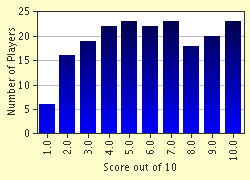Quiz Answer Key and Fun Facts
1. TOMMY DORSEY:
"I'll never love again, I'm so in love with you
I'll never thrill again, to somebody new
Within my heart I know I will never start
To smile again until I smile at you"
These lyrics, sung by Frank Sinatra and the Pied Pipers, would ultimately lead to the biggest hit that the Tommy Dorsey band would ever have. It was #1 for twelve weeks in 1942. It was?
2. GUY LOMBARDO: On the liner notes of an album, it was indicated that Lombardo's biggest hit was #1 for seventeen weeks. Other resources claim it was #1 for five weeks. Whatever, the year was 1937 and here's a slice of the lyric.
"________________________
You've got me crying for you
And as I sit here and sigh, says I
'I can't believe it's true'"
What title word or words fill in that blank?
3. JIMMY DORSEY:
"________________, my pretty little poppy
You're like that lovely flower, so sweet and heavenly
Since I found you, my heart is wrapped around you
And loving you it seems to beat a rhapsody"
Again, the blank is the title. The song dates from 1941 and it was #1 for ten weeks making it the Jimmy Dorsey's Band's biggest ever hit.
4. HARRY JAMES: His biggest hit, a thirteen week chart topper in 1943, was written by Sammy Cahn with music by Jule Styne. I'll give you most of the first stanza without the first line - that line includes the song title. If you tie the two together, you'll answer correctly.
"It's from an old familiar score
I know it well, that melody
It's funny how a theme recalls a favorite dream
A dream that brought you so close to me"
5. SAMMY KAYE:
"Hey, listen to my story 'bout a gal named Daisy Mae
Lazy Daisy Mae
Her disposition is rather sweet and charming
At times alarming, so they say
She has a man who's tall dark handsome, large and strong
To whom she used to sing this song"
#1 for eight weeks in 1941, the title is a synonym for "the old man". But then again, so are all the answers, so remember the era we're dealing with!
6. BENNY GOODMAN:
"You've got to give a little, take a little,
And let your poor heart break a little"
I'm sure the words are familiar to this old chestnut, written by Billy Hill in 1936 and recorded by Goodman the same year. It was #1 for six weeks.
7. DUKE ELLINGTON:
Ellington's biggest hit of all time was a five week #1 in 1934. It was an instrumental and the best hint I can give you as to it's title is that Spike Jones released a novelty version of the same song in 1945 and it became a #4 hit. Also, of the songs that I list, choose the one that probably is least linked to Ellington.
8. LES BROWN:
"To think that we were strangers a couple of nights ago
And though it's a dream, I never dreamed he'd ever say hello
Oh, maybe tonight I'll hold him tight when the moonbeams shine"
This song was #1 for seven weeks in 1945. The title is the next line!
9. ARTIE SHAW: As quiz crafter, I'm gonna cheat on this one. Shaw's biggest hit was the instrumental "Frenesi" in 1940. It was #1 for thirteen weeks and a top thirty song for an incedible thirty weeks! BUT, my favorite big band song of all-time was not this one. It was another Shaw instrumental that was #1 for six weeks in 1938. The title refers to a dance - "Begin The ________" What's the blank?
10. GLENN MILLER: The Miller Orchestra had a bevy of great hits but one stands out. It was #1 for twelve weeks in 1940 and has become THE most popular dance song for Lindy Hoppers and Jitterbuggers ever since. You'll get it!
Source: Author
maddogrick16
This quiz was reviewed by FunTrivia editor
Bruyere before going online.
Any errors found in FunTrivia content are routinely corrected through our feedback system.

